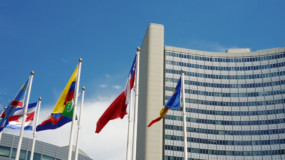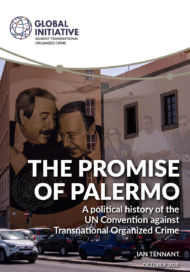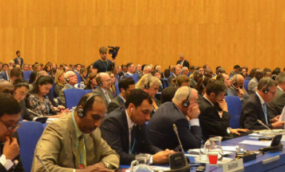Posted on 06 Dec 2022
As the dust settles on the 11th Conference of the Parties (CoP) to the UN Convention against Transnational Organized Crime (UNTOC), we look at the resolutions adopted for two crime types not specifically covered by the convention and its protocols: environmental crimes and trafficking in cultural property.
Between 17 and 21 October, diplomats and officials gathered in Vienna for the 11th session of the UNTOC CoP. Civil society access was high on the agenda, as were issues surrounding the implementation of the convention, its protocols, and how to use the convention to address new and emerging forms of crime. The conference has a broad mandate in terms of the types of crime that can be discussed, but the directives on how to address them are limited to what is stipulated in the convention, so any new policy decisions or recommendations must be situated within that context. Nonetheless, the conference did agree to a number of resolutions on international cooperation, technical assistance, environmental crimes, trafficking in cultural property, trafficking in persons and trafficking in firearms. This blog analyzes the commitments states made specifically to environmental crimes and trafficking in cultural property.
Environmental crimes
Although the convention does not have a specific protocol for addressing environmental crimes, at the previous CoP in 2020, states mandated the conference’s Working Groups on International Cooperation and Technical Assistance to hold a joint thematic discussion on how the UNTOC could be used to address ‘transnational organized crimes that effect the environment’, as an outcome of a resolution tabled by France. These discussions took place in 2022 and as dedicated discussions under the UN Commission on Crime Prevention and Criminal Justice (CCPCJ), demonstrating the ongoing priority that states are affording to environmental crime through multilateral forums. Through the resolution at this year’s CoP, tabled by the chairs of the above-mentioned working groups, rather than by national delegations, states endorsed the recommendations of the working groups agreed to through a joint meeting held in May 2022.
The recommendations start with a high-level encouragement to make ‘crimes that affect the environment’ serious crimes as defined by the UNTOC, in order to facilitate international cooperation. States are also encouraged to:
- Consider making such crimes predicate offences for money-laundering purposes, and enhance financial investigations.
- Strengthen international cooperation and make use of the appropriate provisions of the UNTOC and the UN Convention against Corruption (UNCAC) in doing so, including extradition provisions and joint investigations. States should consider applying a dual criminality principle focused on whether the conduct is an offence in both countries (rather than considering whether the category or denomination of crime is the same), and to fill gaps in existing legislation.
- Share information on the links between these crimes and other forms of organized crime.
- Strengthen cooperation with international and regional organizations, and other stakeholders (including civil society – NGOs are specifically mentioned).
- Make better use of technology in facilitating prosecution and investigation efforts.
The resolution also calls on the UN Office on Drugs and Crime (UNODC) to continue collecting data on environmental crimes, as well as on the nexus between these crimes and other forms of transnational organized crime, and for the UNODC to continue providing assistance to states to support them in addressing these crimes through the UNTOC. The resolution reiterates the invitation to states to provide their views on a new UNTOC protocol dedicated to illicit trafficking in wildlife, as per CCPCJ resolution 31/1.
Although this resolution does not represent any new commitments, it does compile the ways in which states are looking at this issue through the UNTOC, and the priority that environmental crimes have been given in diplomatic terms in recent years. It does not, however, touch on some of the more fundamental or politically sensitive issues that need to be addressed, such as the lack of data on the effectiveness of the UNTOC, which will no doubt come to the fore as the additional protocol is debated in the future. The inadequacy of CITES as an enforcement tool is widely accepted, but it is yet to be seen what states will say about the possibilities and limitations of the UNTOC as an enforcement tool for the illegal trade in endangered wildlife in the context of a potential new protocol.
Cultural property
A resolution on ‘strengthening crime prevention and criminal justice responses to protect cultural property, […] including in the context of armed conflict and natural disasters’ was tabled by the State of Palestine, with the support of Egypt, Lebanon, Saudi Arabia, Sudan and Yemen. Discussions around trafficking in cultural property under the crime policy agenda at the UNODC have touched on politically sensitive areas in the past, partly because of the ongoing disputes between countries who hold the cultural property of other countries in their museums (usually as a result of colonialism or conflict). Trafficking in cultural property can also be linked to ongoing conflicts and other forms of organized crime, and is highly profitable, so the topic tends to be politically charged. However, despite some difficult negotiations, states agreed to pass this resolution, which calls on them to ratify relevant instruments and make use of the UNTOC in responding to trafficking in cultural property, including by making it a serious crime (as defined by the UNTOC), in order to facilitate international cooperation. The resolution also requests that states take measures to raise public awareness, mount media campaigns and build institutional capacity.
Notably, the UNODC (whose role it is to implement or follow up on CoP resolutions) has been given the fairly weak mandate to ‘explore how best to collect, analyse, and disseminate relevant data’ on the topic of trafficking in cultural property, in cooperation with the UN Educational, Scientific and Cultural Organization (UNESCO) and INTERPOL. The deficiency of this mandate should be understood in the reference to cultural property needing to be protected against trafficking even ‘in the context of armed conflict and natural disasters’, where states might not welcome data collection and dissemination. The UNODC is also mandated to cooperate with UNESCO, INTERPOL and ‘other relevant actors’ (civil society does not get a specific reference in this resolution) to organize meetings and seminars on the topic. Outside of the UNODC, states are urged to make full use of INTERPOL’s tools and experience, including through information-sharing and ‘law enforcement-led operational coordination’.
While this resolution focuses on existing instruments, organizations and the UNTOC, it raises the profile of this particularly lucrative form of transnational organized crime.
Taken together, these resolutions highlight two crime types not specifically referenced under the UNTOC. Both are linked to other types of criminal, corrupt and violent activities, and both require enhanced international cooperation. The responses and recommendations proposed through the CoP inevitably focus on the use of the UNTOC as a tool to address them. However, the efficacy and efficiency of the UNTOC is still not well understood, as demonstrated by the delays and slow progress in the Implementation Review Mechanism. It is imperative, therefore, that as states and others continue to discuss how to extend the application of UNTOC to more forms of crime, complementary discussions take place to critically evaluate the impact of the convention, making use of the expert insights of civil society.



